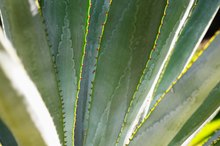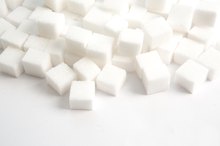What does fact checked mean?
At Healthfully, we strive to deliver objective content that is accurate and up-to-date. Our team periodically reviews articles in order to ensure content quality. The sources cited below consist of evidence from peer-reviewed journals, prominent medical organizations, academic associations, and government data.
The information contained on this site is for informational purposes only, and should not be used as a substitute for the advice of a professional health care provider. Please check with the appropriate physician regarding health questions and concerns. Although we strive to deliver accurate and up-to-date information, no guarantee to that effect is made.
Health Benefits of Cactus Honey Powder
It may come as a surprise, but cactus honey powder is not a bee product. This white powder sweetener comes from the agave plant, a cactus plant native to Mexico. The agave juice is extracted from the plant, filtered and finally heated to remove moisture, resulting in a powder. In its liquid form, it is more commonly known as agave syrup and can generally be found in health stores and major supermarkets. Although the nutritional value of cactus honey powder is low, certain benefits of the agave plant make it a natural sweetener worth considering.
Lower Glycemic Scale Rating
Although agave is 1.4 times sweeter than refined white sugar, it is ranked lower on the glycemic scale for sweeteners. Because of this, agave results in a decreased blood sugar distribution to the blood stream, as opposed to refined white sugar. The ranking for agave is around 27 while the ranking for refined white cane sugar is approximately double that number.
Saponins
Apple Varieties With Less Sugar
Learn More
Agave contains saponins, which are phytochemicals. While they may be toxic in large amounts, they may reduce elevated cholesterol levels in small amounts. Saponins may also decrease your risk of cancer due to their antioxidant activity your body, preventing cell damage by protecting lipids from free radical damage. These phytochemicals improve the immune system by stimulating antibody production.
- Agave contains saponins, which are phytochemicals.
- Saponins may also decrease your risk of cancer due to their antioxidant activity your body, preventing cell damage by protecting lipids from free radical damage.
Fructans
Fructans are chemical structures of fructose. They are naturally produced by 15 percent of flowering plant species. Fructans are part of the carbohydrate family and are attributed with providing four calories of energy per gram. When processed, fructans may give a steady energy for up to 12 hours, depending on your metabolic rate. Agave contains 15 to 20 percent fructans. Fructans do not require insulin for digestion, making them ideal if you have diabetes.
- Fructans are chemical structures of fructose.
- Fructans do not require insulin for digestion, making them ideal if you have diabetes.
Good Transitional Sweetener
What Is the Glycemic Index of Fructose Corn Syrup?
Learn More
Agave consists mostly of fructose and imparts a glycemic index, or GI, value similar to many green vegetables. Therefore, it typically does not cause the blood sugar level to spike. Cane sugar, however, has a GI value approximately twice that of agave. Since agave is around 1.4 times sweeter than refined cane sugar, it is a good choice when transitioning from the higher GI value sweeteners, allowing you to still enjoy the sweetness while moving to a lower position on the GI scale. Cactus honey powder contains approximately 14 grams of carbohydrates, 3 milligrams of sodium, one percent calcium and one percent iron. Each tablespoon contains approximately 55 calories.
- Agave consists mostly of fructose and imparts a glycemic index, or GI, value similar to many green vegetables.
Related Articles
References
- University of Texas: The Uses of Chihuahuan Desert Plants
- University of Florida Extension: Agave and Yucca: Tough Plants for Tough Times
- The Linus Pauling Institute: Saponins: Surprising Benefits of Desert Plants
- Sweetener, syrup, agave. FoodData Central. U.S. Department of Agriculture. Published April 1, 2019.
- Schaefer EJ, Gleason JA, Dansinger ML. Dietary fructose and glucose differentially affect lipid and glucose homeostasis. J Nutr. 2009;139(6):1257S-1262S. doi:10.3945/jn.108.098186
- Stanhope KL, Schwarz JM, Havel PJ. Adverse metabolic effects of dietary fructose: Results from the recent epidemiological, clinical, and mechanistic studies. Curr Opin Lipidol. 2013;24(3):198-206. doi:10.1097/mol.0b013e3283613bca
- Gardner E. Alternative sugars: Agave nectar. Br Dent J. 2017;223(4):241. doi:10.1038/sj.bdj.2017.697
- Rippe JM, Angelopoulos TJ. Sucrose, high-fructose corn syrup, and fructose, their metabolism and potential health effects: What do we really know?. Adv Nutr. 2013;4(2):236-45. doi:10.3945/an.112.002824
- Alwahsh SM, Gebhardt R. Dietary fructose as a risk factor for non-alcoholic fatty liver disease (NAFLD). Arch Toxicol. 2017;91(4):1545-1563. doi:10.1007/s00204-016-1892-7
- Organic Certifying Agents. USDA Agricultural Marketing Service.
Writer Bio
Karen Curinga has been writing published articles since 2003 and is the author of multiple books. Her articles have appeared in "UTHeath," "Catalyst" and more. Curinga is a freelance writer and certified coach/consultant who has worked with hundreds of clients. She received a Bachelor of Science in psychology.









